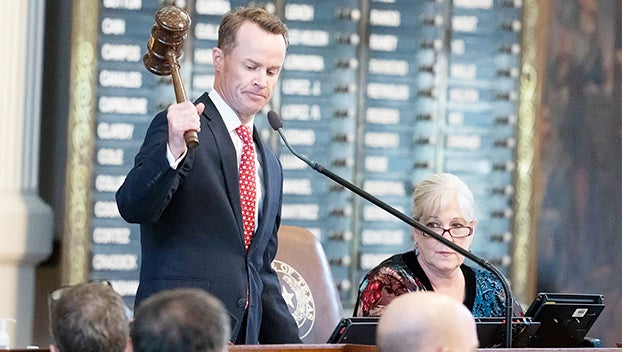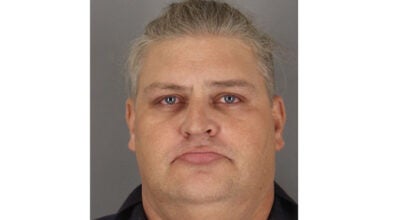May 28 runoff promises high-profile contest to shape Texas House
Published 4:55 pm Thursday, March 7, 2024

- House Speaker Dade Phelan gavels out the 88th session Sine Die on May 29, 2023. (Bob Daemmrich/The Texas Tribune)
|
Getting your Trinity Audio player ready...
|
“Show the speaker voting aye.”
Rep. Dade Phelan cast a rare vote last May, his voice cutting through the din of the packed House as members scrambled to register their votes on the question of impeaching Attorney General Ken Paxton over accusations of bribery and malfeasance.
Phelan, at the height of his power, was sending a message when he gave his full support to ousting a popular statewide official, whom he said was too corrupt to remain in power. The Beaumont Republican knew it would ignite an ugly fight within his party about holding one of their own accountable. He thought his side would win.
Paxton — emboldened after the Senate acquitted him — vowed revenge.
Ten months later, Phelan is the first House speaker in 52 years to be forced into a primary runoff, where he will face Paxton-backed challenger David Covey. On Tuesday, Phelan came in second to Covey, trailing his challenger by about 3 percentage points, or 1,000 votes.
His political career — let alone his speakership — hangs by a thread.
Phelan said the contest is a “battle for the soul” of District 21.
“Against a tidal wave of outside influence and the relentless flood of special interest dollars… our campaign emerges today still standing strong,” Phelan said Tuesday evening. “The barrage aimed at our campaign over the past year was meant to be my undoing, and yet here I am, emerging from the most contentious and expensive primary in state history still fighting and more determined than ever.”
Covey said the result reflected how he is more attuned to the needs of district residents.
“The people of House District 21 have put every politician in Texas, and the nation, on notice,” Covey said in a statement. “Our elected officials are elected by the people and work for the people, and when they don’t, there will be consequences.”
And for Paxton, the outcome was a rallying cry for conservatives across Texas to finish off Phelan once and for all.
“We must continue to stand firm against the liberal agenda represented by Dade Phelan and his allies,” Paxton said in a statement. “Together, we will ensure that the Texas Capitol remains a bastion of conservative values, free from the influence of the Austin swamp.”
Jason Villalba, a former Republican state representative from Dallas who served alongside Phelan, said the fact that that the speaker made a runoff despite the concerted and well-funded campaign to oust him speaks to his strength as a candidate.
“He has exhibited the moxie to withstand these kinds of attacks and he made it past what I think was the hardest challenge,” Villalba said. “I think he survives, but I’m not confident in that.
Runoff awaits
The May 28 runoff promises to be an expensive, high-profile contest that will help reshape the political dynamics of the Texas House.
Tuesday’s results showed the growing influence of the far-right wing of the Republican Party, which has attacked the House and its GOP majority as beholden to liberal interests, with Phelan as its chief capitulator — even as the body has passed some of the most conservative laws in recent memory related to guns, abortion and the border. Nine of Phelan’s incumbent Republicans lost outright to Republican challengers, while another seven face runoffs.
That theme was on display in House District 21, a three-county elbow of Texas along the Louisiana border that is reliably Republican.
Covey, an Orange County Republican Party chairman who has never held public office, has benefitted from the zealous backing of the anti-Phelan camp.
That faction includes Lt. Gov. Dan Patrick, former President Donald Trump, Agriculture Commissioner Sid Miller, state GOP Chair Matt Rinaldi and Paxton, who campaigned for Covey in Beaumont.
Patrick, who frequently clashed with Phelan last year, blasted the House’s impeachment of Paxton and called on the speaker to resign, said he was pleased with the primary results.
“The expiration date on Dade Phelan’s Speakership is plainly written on the bottle,” Patrick said in a statement. “Last night was a referendum on his leadership and Republican voters, the conservative majority, spoke with great clarity.”
Gov. Greg Abbott, who has expressed dissatisfaction with the House after members failed to pass his preferred school voucher bill last year, has remained silent on the race, a sign of indifference towards the speaker’s fate.
Local impact
Phelan, who had never faced a primary challenger in his decade in office, retains the backing of local establishment Republicans, including the Orange and Jefferson GOP chairs and Beaumont Mayor Roy West.
But even the support of former Gov. Rick Perry, who attended two rallies for Phelan last month, was not enough to help avoid a runoff. He said the race was really about wealthy out-of-district detractors who want Phelan deposed for their own political reasons.
“My bet is that the bulk of the people who are trying to weigh in and tell you how to vote have never even been to Beaumont, have never even been to Orange County or Jasper County or Jefferson County,” Perry said at an event in Vidor.
Phelan, 48, is from one of the most prominent families in Beaumont, which traces its roots — and its wealth — to the Texas oil boom that began there. He framed his campaign around two themes: his history of securing funds for his district and delivering conservative policy wins in the House.
Phelan reminded voters that he secured investments for mental health, local colleges and disaster preparedness, including a $1.7 billion for statewide flood protection after Hurricane Harvey that greatly benefited his district.
The speaker and his deputies also shepherded the passage of conservative wish list items once considered too extreme for many Republicans, including a near-total ban on abortion and permitless carry of handguns in 2021. Abbott touted that session as the most conservative in modern history.
Last year, as Republican voters cited border security as the issue they care most about, Phelan’s House made crossing the Rio Grande illegally a state crime and appropriated $1.5 billion for border walls and fencing.
His reaction to attacks from the far-right that he is a sellout to the conservative causes is a mixture of confusion and exasperation.
“I’ve answered the call, year in and year out,” Phelan told the Tribune in January. “And not just on kitchen table issues that make Southeast Texas successful and growing, but on some of the most conservative bills that have ever passed the Legislature.”
Covey, 34, is an oil and gas consultant who has attempted to position himself as the true conservative candidate in the race. From his perspective, Phelan is a sellout who was willing to put the interests of his constituents second to his ambition of winning the speaker’s gavel.
“You have two sides of the Republican Party,” Covey told the Tribune in January. “One is the Karl Rove-Bush line that Phelan is part of, and then one is the Trump-[Ted] Cruz line that says don’t compromise, stand for our principles, pass our priorities. Me and Speaker Phelan are in separate camps.”
Covey has echoed Paxton’s attacks in criticizing Phelan as too liberal.
He said the House’s border security bills last year were insufficient to address the problem. He blasted Phelan’s support for appointing Democratic committee chairs, which angers many Republican primary voters, though he was unable to name a conservative priority that has failed in the House as a result. Covey has also pledged support to the fringe Texas secession movement.
Covey has been heavily funded by Defend Texas Liberty, the political group chiefly bankrolled by Midland oilman Tim Dunn, a Paxton ally and conservative activist. Through January, half of Covey’s contributions had come via a single $50,000 check from the group.
The third candidate in the race, hairdresser and anti-tax crusader Alicia Davis, had little money and institutional support. She won just 10% of votes, but it was enough to prevent Phelan or Covey from capturing the majority needed to win outright.
Written by Zach Despart of The Texas Tribune, a nonpartisan, nonprofit media organization that informs Texans — and engages with them – about public policy, politics, government and statewide issues.





